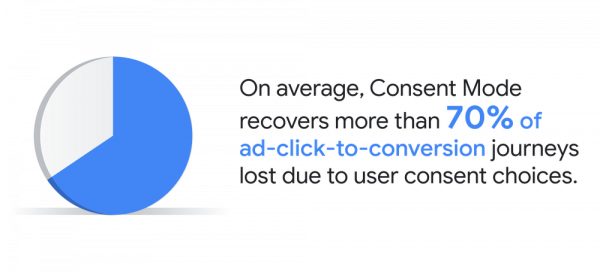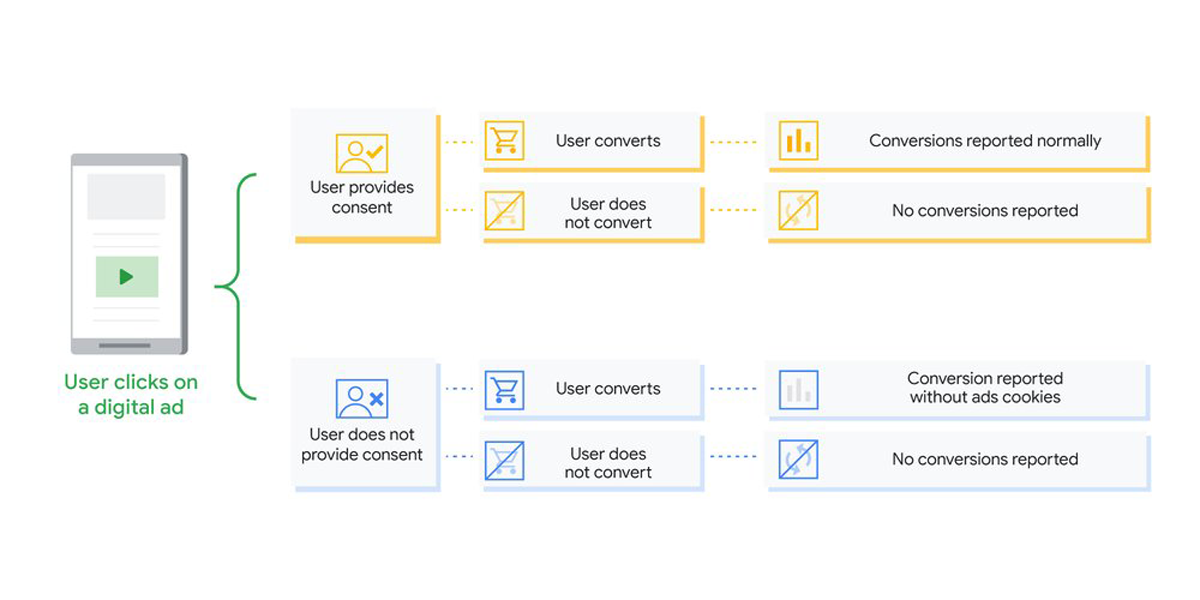Google’s Consent mode, currently in beta, is a data privacy and security solution that is being implemented in relation to the recent push for improved user data privacy. The mode allows website owners to adjust how Google tags behave based on the permissions users have given to your site.
The tags are flexible and will dynamically react, only utilising measurement tools for specific purposes after permission has been given by the user. This can be done by indicating whether or not the user has granted consent for Google Analytics and Google Ads cookies.
Please note that the mode is not a consent platform. A system or solution already needs to be in place for collecting user consent when data is being collected on your site.
 Products that currently support Consent mode
Products that currently support Consent mode
- Google Ads (Includes Ads Conversion Tracking and Remarketing, support for Phone Call Conversions is not currently available but will be in the future)
- Google Analytics
- Floodlight
What happens when Consent mode is deployed?
Consent mode will adjust the behaviour of the following pings once it has been deployed:
- Consent status pings (Ads and Floodlight tags): Pings will be sent from each page the user visits where the mode is implemented. It will also trigger some tags if the permission status is changed from denied to granted and vice versa. Pings will communicate the default state that has been configured by the site owner and/or the state (granted or denied) for each consent type (ad/analytics storage)
- Conversion pings: Pings that are sent to indicate that there has been a conversion
- Analytic pings: Pings that are sent for each page of a website where Analytics is implemented and events are logged
When it is granted, measurement functions will be processed with their defaulted behaviours.
When Google Analytics/Ads storage is denied, associated measurement functions will adjust their behaviour accordingly as identified by the user’s privacy options.
What can pings include?
Pings may include functional information such as:
- Timestamps
- User-agent (Software acting on behalf of the user)
- Referrer
Pings may also include aggregate/non-identifying information such as:
- Boolean information
- Information about the consent platform used by the site owner
- Whether or not the previous or current page in the navigation on the site included ad click information in the URL
Consent mode and Google Ads
Setting up Consent mode with Ads will not affect conversion tracking, rather help measure conversions that are reflective of the user’s permission choices for third-party cookies. For example, if a user does not provide consent for Ads cookies, tags will not use cookies for advertising purposes.
Consent mode and Google Analytics
Setting up the mode with Analytics will result in Analytics being able to understand and respect user consent for Ads cookies. For example, if consent is disabled, Analytics will not read or write Ads cookies. This will result in optional features, like remarketing, being disabled.
Consent mode behaviours
How the default behaviours work as if all Consent options are granted:
| Web | Mobile Apps |
|
|
When one or more forms of Consent are not granted, there are additional behaviours to consider:
| Web | Mobile Apps |
|
|
We hope you have found this blog helpful. If you need to know more about data-privacy or tagging solutions contact our digital analytics team!
Internetrix is an award-winning Australian data and technology company that has been a Google Partner for over a decade!

 Products that currently support Consent mode
Products that currently support Consent mode